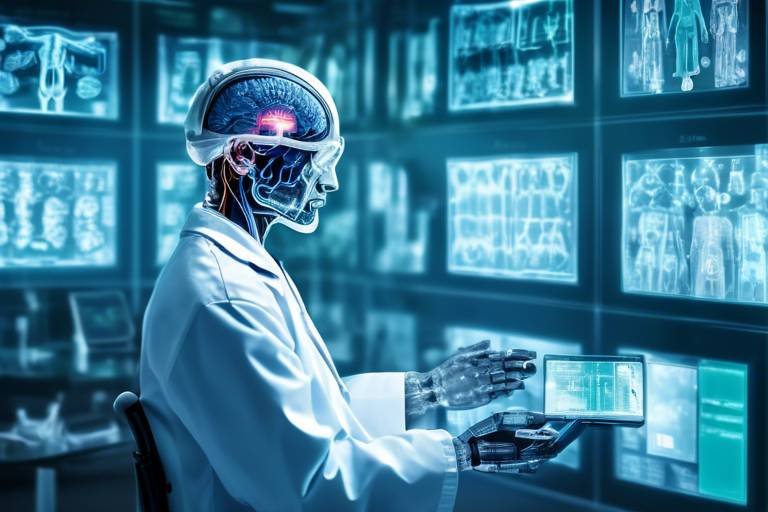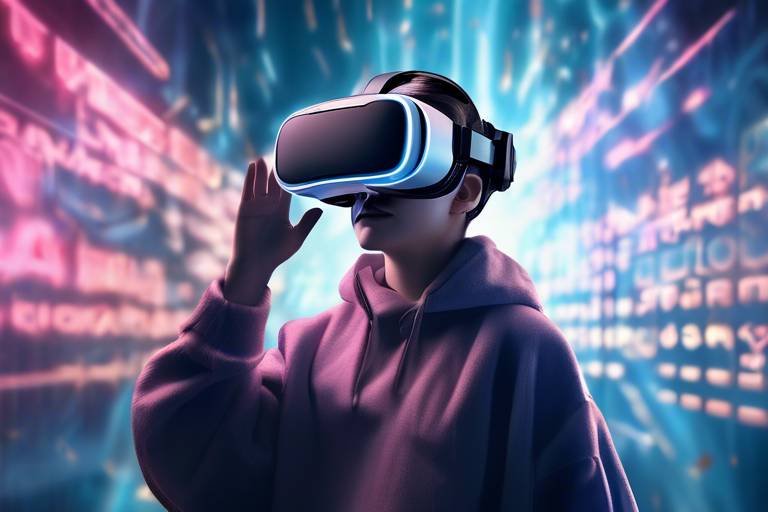AI Innovations Taking Mental Health Care to New Heights
The realm of mental health care is undergoing a profound transformation, thanks to the advent of artificial intelligence (AI). Imagine a world where technology not only assists in diagnosing mental health conditions but also provides personalized treatment plans tailored to individual needs. This isn't just a dream; it's becoming a reality as AI innovations are reshaping the landscape of mental health care. By harnessing the power of data analysis and machine learning, AI is paving the way for more accurate assessments, timely interventions, and improved patient outcomes.
Traditionally, mental health diagnosis and treatment have relied heavily on human intuition and experience. However, with AI's ability to analyze vast amounts of data quickly, we are now able to identify mental health conditions earlier and with greater precision. This means that individuals can receive the support they need before their conditions escalate, leading to a more effective treatment journey.
Furthermore, AI is not just limited to diagnostics; it extends its reach into therapeutic support as well. Innovative applications and platforms powered by AI are emerging, providing users with instant access to mental health resources and support. This accessibility is crucial in a world where many individuals struggle to find the help they need due to stigma or logistical barriers. Imagine being able to connect with a mental health professional or access therapeutic tools from the comfort of your home, at any hour of the day. This is the new reality that AI is creating.
As we delve deeper into the capabilities of AI in mental health care, it's essential to recognize that while the benefits are substantial, there are also ethical considerations that must be addressed. Issues surrounding patient privacy, data security, and algorithmic bias are paramount. Ensuring that AI systems are designed and implemented responsibly will be critical in maintaining trust and efficacy in mental health care.
In summary, the integration of AI into mental health care is not just enhancing treatment options; it's revolutionizing the entire field. With ongoing advancements and research, the future of mental health care looks promising, filled with opportunities for personalized, effective, and accessible treatment solutions. As we continue to explore these innovations, we must also remain vigilant in addressing the ethical implications to ensure that AI serves as a tool for positive change in mental health care.
- How does AI improve mental health diagnosis?
AI enhances diagnosis by analyzing large datasets to identify patterns and symptoms that may not be immediately apparent to human clinicians.
- What are AI-powered therapy tools?
These are applications and platforms that provide therapeutic support, including chatbots and virtual therapy sessions, making mental health care more accessible.
- Are AI chatbots effective for mental health support?
Yes, they can provide immediate assistance and resources, making it easier for individuals to seek help without the fear of stigma.
- What ethical concerns are associated with AI in mental health?
Key concerns include patient privacy, data security, and the potential for bias in AI algorithms that could affect treatment outcomes.
- What does the future hold for AI in mental health care?
The future may see greater integration of AI with traditional therapies, leading to more personalized treatment plans and improved patient satisfaction.

The Role of AI in Diagnosis
Artificial Intelligence (AI) is making waves in the mental health sector, particularly in the realm of diagnosis. Traditional methods of diagnosing mental health conditions often rely heavily on subjective assessments and lengthy interviews, which can lead to inconsistencies and delays in treatment. With AI, we are witnessing a transformation that enhances accuracy and speeds up the diagnostic process. Imagine a world where conditions like anxiety, depression, or even more complex disorders can be identified early, allowing for timely intervention. This is not just a dream; it's becoming a reality.
AI technologies, such as machine learning algorithms, are now capable of analyzing vast amounts of data, including patient histories, behavioral patterns, and even biological markers. By utilizing advanced statistical methods, these algorithms can identify subtle patterns that may escape even the most experienced clinicians. For instance, AI can analyze speech patterns, facial expressions, and even social media activity to provide a more comprehensive view of a patient's mental state. This multifaceted approach is akin to having a highly skilled detective on the case, piecing together clues that lead to a clearer picture of mental health.
Moreover, AI-driven diagnostic tools can significantly reduce the time it takes to reach a diagnosis. In many cases, they can provide results in real-time, enabling healthcare providers to make informed decisions more quickly. This rapid response is crucial, especially for conditions that can deteriorate if left untreated. For example, a patient exhibiting signs of severe depression can receive immediate feedback and intervention suggestions, rather than waiting weeks for a traditional assessment. The table below illustrates the key differences between traditional and AI-assisted diagnostic methods:
| Aspect | Traditional Methods | AI-Assisted Methods |
|---|---|---|
| Speed | Time-consuming assessments | Real-time analysis |
| Accuracy | Subjective evaluations | Data-driven insights |
| Data Utilization | Limited data sources | Multifaceted data analysis |
| Patient Engagement | In-person consultations | Remote monitoring options |
In addition to improving accuracy and speed, AI also opens up new avenues for early detection of mental health issues. For example, AI can analyze trends in a patient's data over time, identifying potential issues before they escalate. This proactive approach is similar to having a personal health coach who not only reacts to problems but also anticipates them, guiding individuals toward better mental health outcomes.
However, while the benefits of AI in diagnosis are significant, it is essential to remember that these technologies are not meant to replace human clinicians. Instead, they serve as powerful tools that can augment the capabilities of mental health professionals. The collaboration between AI and human expertise can lead to a more effective and nuanced understanding of mental health, ultimately benefiting patients in profound ways.
As we look to the future, the role of AI in mental health diagnosis promises to grow even more influential. With ongoing advancements in technology and research, we can expect to see even more innovative solutions that enhance the diagnostic process, making mental health care more accessible and effective for everyone. The question is, are we ready to embrace this change and harness the power of AI for better mental health outcomes?

AI-Powered Therapy Tools
In recent years, have emerged as a groundbreaking solution in the mental health landscape. These innovative applications and platforms are not just tech gimmicks; they are reshaping how therapy is delivered and experienced. Imagine having a personal therapist available at your fingertips, ready to assist you when you need it most. This is the promise that AI brings to the table, offering personalized treatment plans tailored to individual needs, preferences, and circumstances.
One of the most exciting aspects of these tools is their ability to analyze vast amounts of data quickly and accurately. By leveraging machine learning algorithms, AI can identify patterns in a patient's behavior and emotions, leading to insights that might be missed in traditional therapy settings. For instance, an AI tool can track a user's mood over time and suggest interventions or coping strategies that have proven effective for similar individuals. This level of personalization is a game changer, as it empowers patients to take an active role in their mental health journey.
Moreover, the accessibility of these AI tools cannot be overstated. With just a smartphone or computer, individuals can access mental health support from the comfort of their homes. This is particularly crucial for those who may feel uncomfortable seeking help in person due to stigma or logistical challenges. AI-powered therapy tools break down these barriers, making it easier for anyone to seek help. Whether you're dealing with anxiety, depression, or stress, you can find a tool that meets your needs.
One of the most popular forms of AI-powered therapy tools is the use of chatbots. These virtual assistants provide immediate support and resources for individuals seeking mental health assistance. They are designed to engage in conversation, offering a safe space for users to express their feelings and concerns. Just think about it: instead of waiting weeks for an appointment, you can chat with a bot that understands your situation and can provide guidance right away.
One of the standout features of these chatbots is their 24/7 availability. No matter what time of day or night, users can reach out and receive support. This constant access is vital, especially during moments of crisis when immediate help is needed. For example, if someone is feeling overwhelmed at 2 AM, they can send a message to a chatbot and receive comforting responses, resources, or coping strategies without any delay.
Furthermore, AI chatbots play a significant role in reducing stigma associated with seeking mental health support. Many individuals feel hesitant to reach out to a professional due to fear of judgment. However, chatbots provide an anonymous and non-judgmental platform for users to explore their feelings. This can encourage more people to seek help, knowing they can do so without the fear of being labeled or judged.
As we continue to embrace these advancements in AI technology, it's crucial to recognize their potential to enhance mental health care. With ongoing improvements and innovations, AI-powered therapy tools are set to become an integral part of our mental health support systems, providing not only immediate assistance but also paving the way for a more personalized and accessible future in therapy.
- What are AI-powered therapy tools? These are applications and platforms that use artificial intelligence to provide mental health support, personalized treatment plans, and immediate assistance through chatbots and other technologies.
- How do chatbots help with mental health? Chatbots offer immediate support and resources, provide a safe space for individuals to express their feelings, and reduce the stigma associated with seeking help.
- Are AI therapy tools effective? Yes, many studies suggest that AI therapy tools can be effective in providing support, tracking progress, and offering personalized interventions based on user data.
- Can I rely solely on AI for mental health support? While AI tools can be incredibly helpful, they are best used as a supplement to traditional therapy rather than a complete replacement.

Chatbots for Immediate Support
In today's fast-paced world, where mental health issues are becoming increasingly prevalent, chatbots have emerged as a beacon of hope for many individuals seeking immediate support. Imagine a friend who is always there for you, ready to listen and offer guidance at any hour of the day or night. That's what these AI-powered chatbots provide—an accessible and non-judgmental space for those who need it most. With just a few taps on a screen, users can engage with a chatbot, sharing their thoughts, feelings, and concerns without the fear of being judged.
One of the most remarkable features of chatbots is their 24/7 availability. Unlike traditional therapy sessions, which usually require appointments during business hours, chatbots are always on standby. This means that whether it’s the middle of the night or during a lunch break, individuals can reach out for support. This immediacy can be crucial for someone in crisis, providing them with the resources and reassurance they need at a moment's notice.
Moreover, chatbots play a pivotal role in reducing stigma surrounding mental health. For many, the idea of seeking help can be daunting, often accompanied by feelings of shame or embarrassment. By interacting with a chatbot, users can experience a sense of anonymity that traditional therapy may not offer. This non-judgmental interaction allows individuals to express their feelings freely, which can be the first step toward seeking further help if needed.
These chatbots are not just programmed to respond; they are designed to learn and adapt. Utilizing advanced natural language processing and machine learning algorithms, they can analyze user interactions to provide increasingly personalized responses over time. This creates a more engaging experience, making users feel understood and supported. As they gather data, chatbots can also identify patterns in user behavior and emotions, which can be invaluable for mental health professionals looking to tailor their treatment plans.
In summary, chatbots are revolutionizing the way individuals access mental health support. They offer immediate assistance, promote anonymity, and adapt to user needs, making them a vital tool in the modern mental health landscape. As technology continues to evolve, the potential for these AI-driven platforms to enhance mental health care is limitless, paving the way for a future where help is always just a message away.
- What are chatbots? Chatbots are AI-powered programs designed to simulate conversation with users, providing support and information on various topics, including mental health.
- How do chatbots help with mental health? They offer immediate support, reduce stigma, and provide a safe space for users to express their feelings and concerns.
- Are chatbots a replacement for therapy? While they can provide valuable support, chatbots are not a substitute for professional therapy. They are best used as a supplementary resource.
- Can chatbots provide personalized responses? Yes, many chatbots use machine learning to adapt their responses based on user interactions, making the experience more personalized over time.

24/7 Availability
Imagine a world where help is just a click away, no matter the hour. This is the magic of AI chatbots in mental health care. They provide round-the-clock support, ensuring that individuals can access mental health resources whenever they need them. Whether it’s the middle of the night or during a busy workday, these digital companions are always ready to listen and guide.
The beauty of AI chatbots lies in their ability to offer immediate assistance without the constraints of traditional therapy schedules. This means that if someone feels overwhelmed at 2 AM, they can reach out and receive support instantly. It’s like having a friend who never sleeps, always available to lend an ear or provide coping strategies. This unprecedented accessibility can be a game-changer for those who might hesitate to seek help due to time constraints or fear of judgment.
Moreover, AI chatbots can handle a wide range of inquiries, from basic questions about mental health to more complex emotional support. They can guide users through mindfulness exercises, suggest coping mechanisms, or simply provide a safe space to express feelings. The result? A significant reduction in the feeling of isolation that many individuals experience when facing mental health challenges.
Additionally, the anonymity that chatbots offer allows users to engage in conversations without the fear of stigma. This is particularly important in cultures where discussing mental health is still taboo. By providing a non-judgmental platform, AI chatbots encourage more people to seek help and explore their feelings without reservation. It’s a step toward normalizing mental health discussions and making support more accessible.
In summary, the 24/7 availability of AI chatbots is reshaping the landscape of mental health care. By breaking down barriers related to time and stigma, these tools are paving the way for a more inclusive and supportive environment for individuals seeking help. As technology continues to evolve, we can only expect these digital allies to become even more sophisticated, further enhancing their ability to provide immediate and effective support.

Reducing Stigma
In a world where mental health issues are often shrouded in misunderstanding and fear, AI chatbots are stepping in to create a safe space for individuals seeking help. Imagine a scenario where someone is feeling overwhelmed but is hesitant to reach out to a friend or a therapist due to the fear of being judged. This is where AI comes into play, acting like a friendly companion that is always there, ready to listen without any preconceived notions or biases.
AI chatbots provide a unique opportunity to reduce stigma by facilitating anonymous interactions. Users can engage with these digital assistants without revealing their identity, allowing them to express their feelings freely. This anonymity can be a game-changer, especially for those who might feel uncomfortable discussing their mental health struggles in person. As a result, individuals are more likely to seek help when they know they can do so without the fear of being labeled.
Moreover, these AI-driven platforms often include educational resources that help demystify mental health issues. By providing accurate information and debunking common myths, chatbots can help shift societal perceptions. For example, they can address misconceptions like:
- Mental health issues are a sign of weakness.
- Only 'certain' people need therapy.
- Talking about mental health will only make things worse.
By tackling these myths head-on, AI chatbots not only support individuals in need but also contribute to a broader cultural shift towards acceptance and understanding of mental health. The more these tools are used, the more normalized conversations around mental health become, paving the way for a future where seeking help is seen as a strength rather than a weakness.
In essence, AI chatbots act as a bridge, connecting those in need with resources and support while simultaneously challenging societal norms. They foster an environment where people can feel comfortable discussing their mental health, ultimately leading to a more informed and compassionate society. As we continue to embrace technology in our daily lives, the potential for AI to contribute positively to mental health awareness and stigma reduction is indeed promising.
- How do AI chatbots ensure confidentiality?
AI chatbots are designed to prioritize user privacy, employing encryption and secure data handling practices to protect sensitive information. - Can AI chatbots replace human therapists?
While AI chatbots provide valuable support, they are not a substitute for professional therapy. They can complement traditional methods by offering immediate assistance and resources. - Are AI chatbots effective for everyone?
Effectiveness can vary by individual. Some may find AI chatbots beneficial, while others may prefer human interaction for deeper issues.

Data-Driven Insights for Therapists
In the evolving landscape of mental health care, data-driven insights are becoming invaluable tools for therapists. Imagine having a crystal ball that not only shows you the current state of your patient's mental health but also predicts their future needs and responses to treatment. This is precisely what AI technologies are bringing to the table. By analyzing vast amounts of data, AI can help therapists identify patterns and trends that may not be immediately obvious through traditional methods.
For instance, AI systems can analyze patient histories, treatment responses, and even real-time mood tracking data to provide therapists with a comprehensive understanding of their clients. This allows for a more tailored approach to therapy, ensuring that interventions are not just based on generic models but are specifically designed for the individual. With such insights, therapists can adjust their strategies dynamically, improving the chances of successful outcomes.
Furthermore, AI tools can assist in tracking progress over time. By utilizing quantifiable metrics, therapists can see how their patients are responding to different treatments and make informed decisions about future sessions. This data-driven approach can lead to more effective therapies and greater patient satisfaction, as clients feel their unique needs are being addressed.
To illustrate the impact of data-driven insights, consider the following table that outlines some of the key benefits:
| Benefits | Description |
|---|---|
| Enhanced Understanding | AI analyzes complex data to provide deeper insights into patient behavior and treatment responses. |
| Personalized Interventions | Tailoring treatment plans based on data ensures that each patient receives the most effective care. |
| Progress Tracking | Real-time data allows therapists to monitor patient progress and adjust strategies as needed. |
| Predictive Analytics | AI can forecast potential challenges or relapses, enabling proactive interventions. |
As we embrace these technological advancements, it’s crucial to remember that the human element of therapy remains irreplaceable. Data-driven insights serve to enhance the therapist's ability to connect with their patients on a deeper level, not to replace the empathetic understanding that is essential in mental health care. By leveraging AI, therapists can focus more on building relationships and less on administrative tasks, ultimately leading to a more fulfilling therapeutic experience for both parties.
- How does AI improve mental health diagnosis? AI enhances diagnostic accuracy by analyzing patterns in patient data, enabling earlier identification of mental health conditions.
- Can AI replace human therapists? No, AI is designed to support therapists, not replace them. The human element of empathy and understanding is irreplaceable.
- What are the ethical concerns regarding AI in mental health? Key concerns include patient privacy, data security, and the potential for bias in AI algorithms.
- How can patients benefit from AI-powered therapy tools? Patients gain access to personalized treatment plans, immediate support through chatbots, and more effective tracking of their progress.

Ethical Considerations in AI Usage
As artificial intelligence (AI) continues to weave its way into the fabric of mental health care, it brings with it a plethora of ethical considerations that cannot be overlooked. The integration of AI technologies into therapeutic practices and diagnostic processes is not just a technical advancement; it poses significant questions about privacy, consent, and data security. How do we ensure that the information shared by patients remains protected? What measures are in place to guarantee that consent is informed and voluntary? These are vital questions that stakeholders must address to foster trust and ensure responsible use of AI in mental health.
One of the most pressing issues is patient privacy. With AI systems processing vast amounts of sensitive data, including personal histories and mental health conditions, the risk of data breaches increases significantly. Mental health professionals must be equipped with robust security measures to safeguard this information. For instance, implementing encryption protocols and secure access controls can help mitigate risks. Moreover, patients should be informed about how their data will be used and stored, ensuring transparency in the process.
Another critical ethical aspect is the potential for bias in AI algorithms. AI systems learn from data, and if the data used to train these systems is biased, the outcomes can perpetuate inequities in mental health treatment. For example, an AI tool trained predominantly on data from one demographic may not accurately assess or diagnose conditions in individuals from different backgrounds. This can lead to disparities in treatment outcomes, further marginalizing already vulnerable populations. Therefore, it is essential for developers to prioritize fairness in AI algorithms by diversifying training datasets and continually testing for bias.
To address these ethical concerns, a collaborative effort between technology developers, mental health professionals, and policymakers is necessary. Establishing a framework for ethical AI usage in mental health care could include guidelines for:
- Data Protection: Ensuring stringent measures are in place to protect patient information.
- Informed Consent: Developing clear protocols for obtaining consent from patients before using their data.
- Bias Mitigation: Regularly auditing AI systems for bias and implementing corrective measures when necessary.
Moreover, ongoing education and training for mental health professionals on the implications of AI usage are crucial. They need to be aware of the potential challenges and ethical dilemmas associated with AI technologies, equipping them to navigate these complexities in their practice.
Ultimately, as we embrace the innovations brought forth by AI in mental health care, we must remain vigilant about these ethical considerations. The goal should be to enhance patient care while upholding the highest standards of ethics and responsibility. By doing so, we can ensure that the future of mental health care is not only technologically advanced but also equitable and humane.
Q: What are the main ethical concerns regarding AI in mental health care?
A: The primary ethical concerns include patient privacy, informed consent, and potential biases in AI algorithms that could lead to unequal treatment outcomes.
Q: How can mental health professionals ensure patient data security?
A: They can implement robust security measures such as encryption, secure access controls, and regular audits of their systems to protect sensitive information.
Q: What steps can be taken to mitigate bias in AI algorithms?
A: Developers should use diverse datasets for training AI systems and continuously test for biases to ensure fair and equitable treatment across different demographics.

Patient Privacy and Security
In an era where technology reigns supreme, the importance of patient privacy and data security in mental health care cannot be overstated. As we embrace the advancements brought about by artificial intelligence (AI), we must also recognize the potential risks associated with the storage and processing of sensitive patient information. It's essential to ensure that the systems we implement not only enhance care but also protect the rights and confidentiality of individuals seeking help.
Imagine sharing your most intimate thoughts and feelings with a machine. While AI can provide incredible support, it also raises questions about who has access to that information and how it's used. To address these concerns, mental health care providers must prioritize the following:
- Data Encryption: Utilizing robust encryption methods to protect patient data both in transit and at rest.
- Anonymization: Removing personally identifiable information from datasets to ensure privacy during analysis.
- Access Controls: Implementing strict access controls to limit who can view sensitive data.
- Regular Audits: Conducting frequent security audits to identify and rectify vulnerabilities in the system.
Moreover, it's crucial for healthcare providers to obtain informed consent from patients before utilizing AI tools. This means clearly communicating how their data will be used and ensuring they understand their rights. Transparency fosters trust, and when patients feel secure about how their information is handled, they are more likely to engage with AI-driven solutions.
One significant challenge is the potential for data breaches. With the increasing sophistication of cyber threats, mental health organizations must stay ahead of the curve. This involves not only investing in advanced cybersecurity measures but also training staff to recognize and respond to potential threats. A single breach could jeopardize the trust between patients and providers, making it imperative to take proactive steps in safeguarding information.
Additionally, as AI algorithms are trained on vast datasets, there is a risk of unintentional bias creeping into these systems. This bias can lead to inequitable treatment outcomes, further complicating the landscape of mental health care. Addressing these biases is not just a technological challenge; it requires a commitment to ethical practices and ongoing evaluation of AI systems.
In conclusion, while AI holds tremendous potential to revolutionize mental health care, ensuring patient privacy and data security must be at the forefront of any technological advancement. By prioritizing these issues, mental health professionals can harness the power of AI while maintaining the trust and safety of their patients.
- What measures are taken to ensure patient privacy in AI systems?
Healthcare providers implement data encryption, anonymization, and strict access controls to protect patient information. - How is patient consent obtained for AI usage?
Providers must communicate how patient data will be used and ensure that patients understand their rights before using AI tools. - What are the risks of data breaches in mental health care?
A data breach can compromise patient trust and confidentiality, making it essential to invest in cybersecurity measures. - How can bias in AI algorithms affect treatment outcomes?
Bias can lead to unequal treatment, which is why ongoing evaluation and ethical practices are crucial in AI development.

Bias and Fairness in AI Algorithms
As we venture deeper into the realm of artificial intelligence in mental health care, one of the most pressing issues we face is the bias inherent in AI algorithms. These algorithms are designed to analyze vast amounts of data and make decisions based on patterns. However, if the data fed into these systems is biased, the outcomes can be equally skewed. This poses a significant challenge to the goal of providing equitable mental health care to all individuals, regardless of their background.
Imagine walking into a therapy session and finding that your therapist has preconceived notions about your experiences based on the data they’ve analyzed. This is the risk we take when AI systems reflect societal biases, which can manifest in various ways:
- Data Representation: If the data used to train AI models predominantly features certain demographics, the system may not accurately understand or cater to the needs of underrepresented groups.
- Decision-Making Processes: Algorithms may prioritize certain responses or treatments based on biased data, potentially leading to ineffective or harmful recommendations for individuals from diverse backgrounds.
- Feedback Loops: When biased AI systems are deployed, they can create feedback loops that reinforce existing disparities in mental health treatment, making it even harder for marginalized communities to receive appropriate care.
Addressing these biases is crucial for ensuring that AI technologies promote fairness and inclusivity in mental health care. Developers and researchers must take proactive steps to identify and mitigate bias in AI algorithms. This can be achieved through:
- Diverse Data Sets: Utilizing a wide range of data that accurately reflects the diversity of the population can help create more balanced AI systems.
- Regular Audits: Conducting routine evaluations of AI algorithms to identify and rectify any biases that may have emerged over time.
- Inclusive Design Processes: Involving stakeholders from various backgrounds in the development of AI tools ensures that multiple perspectives are considered, leading to fairer outcomes.
In conclusion, while AI holds immense potential to revolutionize mental health care, it is imperative that we remain vigilant about the biases that can infiltrate these systems. By prioritizing fairness and equity, we can harness the power of AI to create a more inclusive future for mental health treatment, one where every individual feels seen, heard, and understood.
- What is bias in AI algorithms?
Bias in AI algorithms refers to systematic errors that lead to unfair treatment of certain groups, often resulting from skewed data or flawed design processes. - How can we reduce bias in AI for mental health?
Reducing bias involves using diverse data sets, conducting regular audits, and including a variety of perspectives in the design process. - Why is fairness important in mental health care?
Fairness ensures that all individuals receive equal access to effective treatment, which is crucial for improving overall mental health outcomes.

The Future of AI in Mental Health
As we gaze into the horizon of mental health care, it's clear that the future of AI holds incredible promise. With technology advancing at a breakneck speed, the potential for artificial intelligence to revolutionize how we approach mental health is not just a dream—it's becoming a reality. Imagine a world where your therapist is not just a human being, but also an intelligent system that learns from your interactions, adapts to your needs, and provides tailored support at the click of a button. Sounds futuristic, right? Well, it's closer than you think!
One of the most exciting prospects is the integration of AI tools with traditional therapeutic practices. Picture this: you walk into a therapist's office, and instead of starting from scratch, your therapist has access to a wealth of data collected through AI. This data can include your mood patterns, triggers, and even your progress over time. The integration of AI can create a more holistic approach to mental health care, where technology and human empathy work hand-in-hand to provide the best possible support.
Moreover, advancements in AI technology are paving the way for personalized treatment plans. No two individuals are the same, and mental health care should reflect that. With AI's ability to analyze vast amounts of data, it can help in crafting treatment plans that are as unique as the individuals themselves. This means that your therapy could be tailored to your specific needs, preferences, and responses, enhancing overall effectiveness and satisfaction. Imagine having a program that adjusts your therapy based on real-time feedback—it's like having a personal trainer for your mental well-being!
In addition, we can expect AI to facilitate preventive measures in mental health care. By analyzing data trends and patterns, AI can help identify individuals at risk of developing mental health issues before they even realize it. This proactive approach can lead to earlier interventions, reducing the severity of conditions and improving outcomes. It’s akin to having a smoke detector in your home that alerts you before a fire starts—prevention is always better than cure!
However, as we look forward to these advancements, we must also remain vigilant about the challenges that lie ahead. The implementation of AI in mental health care raises important ethical questions. For instance, how do we ensure that these technologies are used responsibly? How do we protect patient data while leveraging AI's capabilities? As we embrace the future, addressing these concerns will be crucial to fostering trust and ensuring that AI serves as a positive force in mental health care.
In conclusion, the future of AI in mental health is not just about technology; it's about enhancing human connection, improving outcomes, and making mental health care more accessible to everyone. As we continue to innovate and explore the depths of AI, we stand on the brink of a new era in mental health care—one that promises to be more inclusive, personalized, and effective than ever before.
- How will AI improve mental health care? AI can provide personalized treatment plans, enhance diagnostic accuracy, and offer immediate support through chatbots, making mental health care more accessible.
- What are the ethical concerns surrounding AI in mental health? Key concerns include patient privacy, data security, and potential biases in AI algorithms that could affect treatment outcomes.
- Can AI replace human therapists? While AI can augment therapy by providing data-driven insights and support, it is unlikely to replace the human touch that is essential in mental health care.
- What is the role of data in AI-driven mental health solutions? Data allows AI to learn and adapt treatment plans based on individual patient needs, leading to more effective interventions.

Integration with Traditional Therapies
As we look to the future of mental health care, one of the most exciting developments is the integration of artificial intelligence (AI) with traditional therapeutic practices. Imagine a world where therapists and AI work hand in hand, combining the human touch of therapy with the precision and efficiency of technology. This collaboration could create a more holistic approach to mental health care, enhancing the overall treatment experience for patients.
AI can assist therapists by providing real-time data and insights about their patients. For instance, AI algorithms can analyze patterns in a patient's behavior, mood, and responses to treatment, offering therapists a clearer picture of their progress. This data-driven approach allows for more tailored interventions, ensuring that therapy is not a one-size-fits-all solution. It’s like having a personal assistant who knows your preferences and needs, helping you navigate your mental health journey more effectively.
Moreover, the integration of AI tools can facilitate better communication between patients and therapists. Imagine a scenario where a patient uses an AI-driven app to log their feelings and experiences throughout the week. This information can then be shared with their therapist during sessions, enabling more focused discussions and targeted strategies. It’s akin to having a roadmap that highlights the most critical areas to address, making therapy sessions more productive and impactful.
However, it’s essential to note that while AI can enhance traditional therapies, it should never replace the human element that is vital in mental health care. The empathy, understanding, and emotional support provided by therapists are irreplaceable. Instead, AI should be viewed as a complementary tool—like a powerful magnifying glass that helps therapists see the finer details of their patients’ experiences.
In conclusion, the integration of AI with traditional therapies holds immense potential for revolutionizing mental health care. By combining the strengths of both approaches, we can create a more effective, personalized, and accessible mental health care system. As we move forward, it will be fascinating to see how this synergy evolves and what innovative solutions emerge from this collaboration.
- How does AI improve mental health diagnosis?
AI improves mental health diagnosis by analyzing large datasets to identify patterns and symptoms that may go unnoticed by human practitioners, leading to earlier and more accurate assessments. - Can AI replace therapists?
No, AI cannot replace therapists. While it can enhance therapy through data insights and support tools, the human connection and empathy provided by therapists are irreplaceable. - What are the ethical concerns regarding AI in mental health?
Ethical concerns include patient privacy, data security, and potential bias in AI algorithms, which must be addressed to ensure responsible use of technology in mental health care. - Will AI make therapy more accessible?
Yes, AI can make therapy more accessible by providing immediate support through chatbots and online platforms, especially for those who may hesitate to seek help in traditional settings.

Personalized Treatment Plans
Imagine a world where your mental health care is as unique as you are. are revolutionizing the way we approach mental health, tailoring interventions to fit individual needs rather than applying a one-size-fits-all solution. With the advent of artificial intelligence, mental health professionals can now analyze a wealth of data from various sources, including patient history, symptoms, and even lifestyle factors, to create highly customized treatment strategies.
AI algorithms can sift through vast amounts of data to identify patterns that may not be immediately evident to human practitioners. For instance, by analyzing responses from various patients, AI can help clinicians determine which therapies are most effective for specific symptoms or conditions. This means that rather than waiting weeks or months to see if a particular treatment is working, patients can receive adjustments to their plans in real-time, enhancing the likelihood of positive outcomes.
Furthermore, the integration of wearable technology and mobile applications can provide continuous monitoring of a patient’s mental health status. These tools can track metrics such as sleep patterns, physical activity, and even mood fluctuations. This data can then be fed back into the AI systems, allowing for a more dynamic approach to treatment. For example, if a patient’s mood dips significantly, their AI-driven platform could alert their therapist, who can then intervene promptly.
Here’s how personalized treatment plans can work in practice:
- Initial Assessment: Patients undergo comprehensive evaluations using AI-driven diagnostic tools to identify their unique mental health challenges.
- Data Collection: Ongoing data collection from various sources, including apps and wearables, helps to monitor progress and adjust treatment as needed.
- Tailored Interventions: Based on the collected data, therapists can design specific interventions that align with the patient’s evolving needs.
- Feedback Loop: Continuous feedback from the patient and data analytics ensures that the treatment plan remains effective and relevant.
This personalized approach not only increases the effectiveness of treatment but also empowers patients by involving them in their care process. They can see how their input and data directly influence their treatment, fostering a sense of agency and ownership over their mental health journey.
As we look to the future, the potential for AI-driven personalized treatment plans is immense. Imagine a system where your treatment evolves alongside you, adapting to your changing needs and circumstances. This could lead to not just improved outcomes, but also a deeper understanding of mental health itself, paving the way for innovations we can only dream of today.
Q1: What are personalized treatment plans?
Personalized treatment plans are customized strategies designed to meet the unique mental health needs of each individual, often enhanced by AI technologies that analyze data to inform treatment decisions.
Q2: How does AI contribute to personalized treatment?
AI analyzes vast amounts of patient data to identify patterns and recommend tailored interventions, allowing for real-time adjustments to treatment plans based on individual progress.
Q3: Can I participate in creating my personalized treatment plan?
Absolutely! Involving patients in their treatment plans is crucial. Patients can provide valuable insights that help inform their unique needs and preferences.
Q4: What technologies are used in personalized treatment plans?
Technologies such as mobile applications, wearable devices, and AI-driven diagnostic tools are commonly used to collect data and monitor patient progress, which informs treatment adjustments.
Q5: Are personalized treatment plans effective?
Yes, research has shown that personalized treatment plans can lead to better outcomes compared to traditional, generalized approaches, as they are tailored to the specific needs and responses of the individual.
Frequently Asked Questions
- How is AI transforming mental health care?
AI is revolutionizing mental health care by enhancing diagnostic accuracy, personalizing treatment options, and providing immediate support through innovative tools like chatbots. This means that patients can receive tailored care that meets their unique needs and circumstances.
- What role do chatbots play in mental health support?
Chatbots serve as accessible, 24/7 resources for individuals seeking mental health support. They provide immediate assistance and information, helping to bridge the gap between patients and mental health professionals while reducing the stigma of seeking help.
- Can AI tools help therapists track patient progress?
Absolutely! AI tools offer therapists valuable data-driven insights, enabling them to monitor patient progress accurately and adjust treatment plans as necessary. This leads to more effective interventions and better outcomes for patients.
- What are the ethical concerns surrounding AI in mental health?
As AI becomes more prevalent in mental health care, ethical concerns such as patient privacy, data security, and algorithmic bias must be addressed. It’s crucial to ensure that AI systems are used responsibly and equitably to protect patients' rights and well-being.
- How can AI address bias in mental health care?
AI can help identify and mitigate bias in treatment by analyzing data patterns and outcomes. By ensuring that AI algorithms are developed with fairness in mind, we can deliver more equitable mental health care to diverse populations.
- What does the future hold for AI in mental health care?
The future of AI in mental health care looks promising, with potential advancements including greater integration with traditional therapies and the development of more personalized treatment plans. This could significantly enhance the effectiveness of mental health interventions.



















